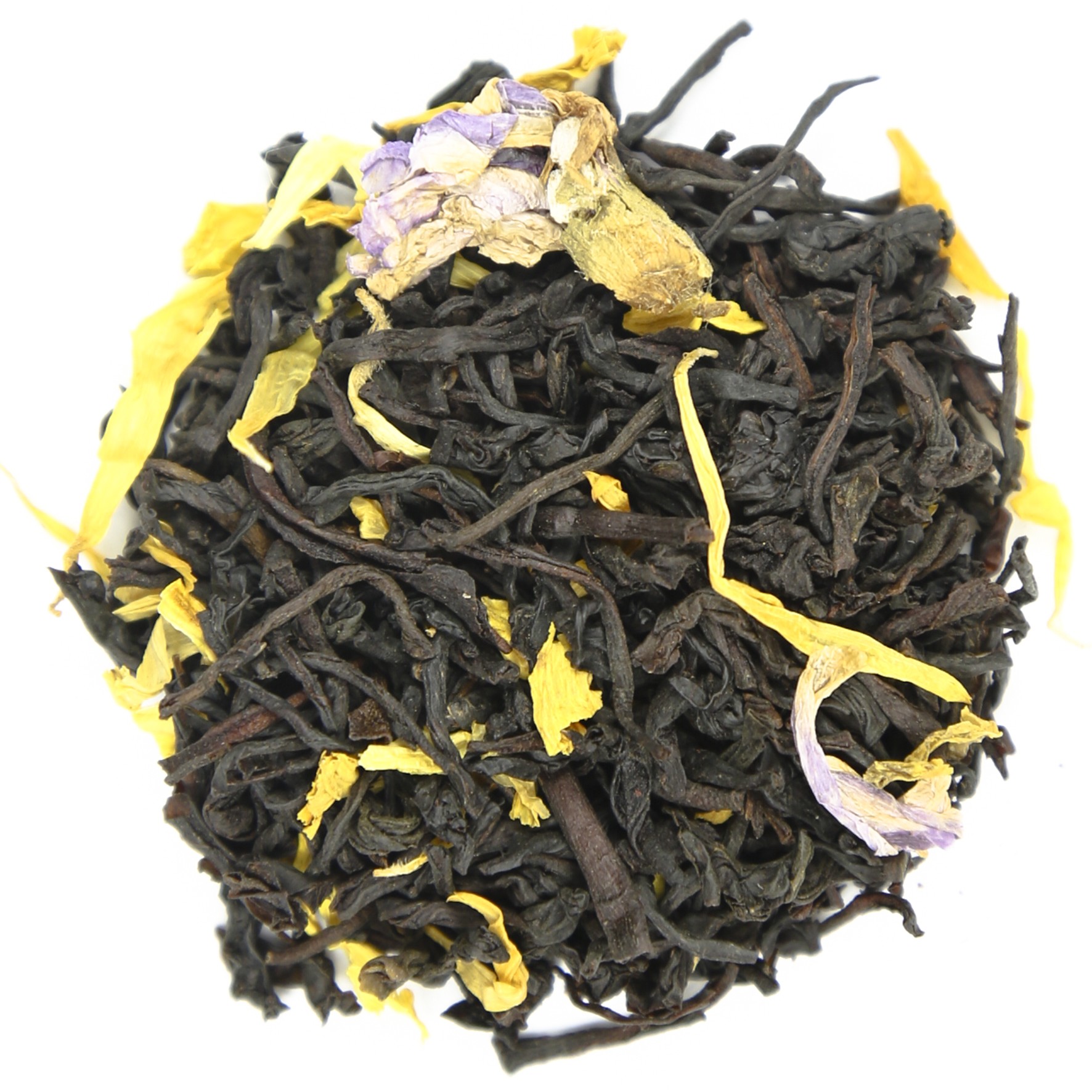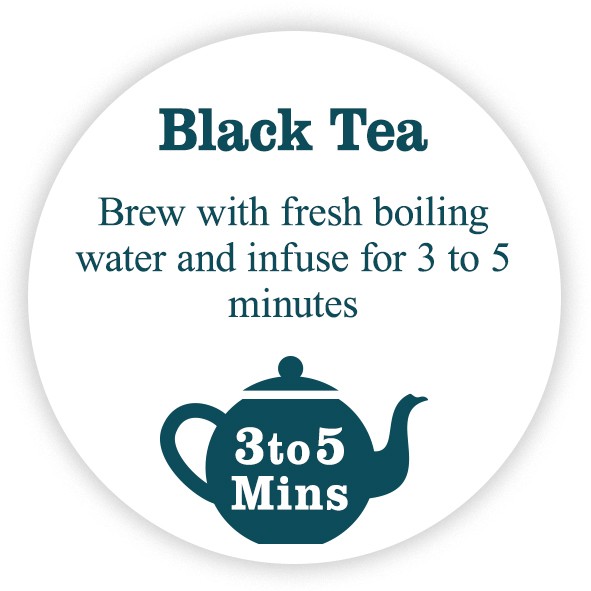Black Tea Brewing Guide

1 Teaspoon
Add 1 teaspoon per person and one for the pot.

95⁰c - 100⁰c
Boil using fresh water, at a temperature of 95⁰ - 100⁰c.

3 - 5 Mins
Steep for 3-5 minutes, depending on personal preference
About Product
-
Product Description
Hazelnut and Vanilla Tea is an indulgent Flavoured Black Tea. Easily recognisable by its nutty and creamy characteristics, it is an excellent choice of brew throughout the day. Its ingredients include Ceylon Tea, Almonds (NUTS), Hazelnuts (NUTS), Sunflower Petals, Calendula Petals, Mallow Petals and All-Natural Flavouring.
We pack it fresh to order here at our Kent-based factory, ensuring quality and consistency.
The Black Tea leaves used as the base component come from Sri Lanka. This island nation – formerly called Ceylon in colonial times – is renowned for producing full-bodied infusions.
Specifically, we use a combination of large Orthodox Ceylon Tea leaves from the growing districts of Nuwara Eliya, Uva and Dimbula. These are of the Orange Pekoe 1 grade, which is the most popular variety from Sri Lanka.
Caffeine Levels
Caffeine is a stimulant existing in at least sixty plants in the wild. While most of the blend’s ingredients don’t contain the chemical compound, Black Tea boasts a considerable amount.
You can expect an average serving to offer about 45-mg of caffeine – more than enough to get out of bed in the morning. It’s time now to show you how to make Hazelnut and Vanilla Tea at its finest and most delicious.
How to Brew Hazelnut and Vanilla Tea
- Purchase a Tea Filter or Infuser for ease and convenience.
- Add about five grams of Loose Tea into the accessory.
- Place the item in a cup and pour in freshly boiled water at 100°C.
- Allow it to infuse for 3-5 minutes.
How to Serve: Milk, sugar, honey or lemon – the choice is yours. Alternatively, serve black.
Tasting Notes: Embrace distinct nutty and creamy characteristics from start to finish.
Contains Allergen: – Almonds (NUTS) and Hazelnuts (NUTS).
Benefits of Hazelnut and Vanilla Black Tea
Hazelnuts have long been associated with lower blood pressure, balanced blood sugar levels, and reduced inflammation. The antioxidant strength of almonds, meanwhile, can decrease “bad” LDL cholesterol and even promote weight loss.
Then there is Black Tea. According to a 2015 meta-analysis, its frequent consumption can reduce the risk of developing certain types of cancer by at least 2%. If you want to learn more about the benefits you can read our Black Tea Benefits blog post.
-
Delivery Information
We offer reliable delivery services through Royal Mail to ensure that your orders reach you on time.
Here are the main points you should be aware of:
- Standard UK Delivery: £3.95 excluding delivery charge.
- Delivery Times: Orders are processed and dispatched within 2-5 working days but they may take longer during busy times. It is worth noting that all our orders are packed by hand in order to maintain the quality.
- Free Delivery: We are delighted to provide free shipping for UK orders over £35*. Moreover, customers from Europe can enjoy free shipping for any purchase above €75*. Furthermore, we offer free delivery in the USA for all purchases exceeding $125*. Please note terms and conditions may apply.
- Tracking: When your package is sent you will receive a tracking number via email so as to keep tabs of its progress.
International Shipping
We do ship worldwide meaning our products can be accessed by anyone around the world.
Here are some important details:
- Delivery Times: International deliveries vary based on destination, generally taking between 7-14 working days.
- Shipping Costs: International shipping costs are calculated at checkout based on your location and weight of your order. View full delivery charges for your location.
- Customs and Import Duties: Remember customs or import duties may exist depending on regulations in your country; these charges are borne by the customer.
Returns Policy
Your satisfaction is our top priority, however if for any reasons you’re not completely happy with your purchase, simply follow our returns procedure:
- Eligibility: Items returned within 30 days of receipt must remain unopened and in their original condition.
- Process: In order to return an item contact our customer service department using your unique order number after which detailed instructions will be given concerning returning them back to us securely.
- Refunds: Our aim is to refund you within 5-7 working days upon successful reception of returned goods. The refund amount will be credited to your original payment method.
For any other Enquiries or help please contact our Customer Support Team always at your service.
-
Product Reviews

 Loose Leaf Tea
Loose Leaf Tea Pyramids
Pyramids Tea Bags
Tea Bags Africa
Africa Assam
Assam Ceylon
Ceylon Chinese
Chinese Darjeeling
Darjeeling European
European Indian
Indian Japan
Japan Nepal
Nepal South East Asia
South East Asia Ayurveda Tea
Ayurveda Tea Black Tea
Black Tea Chai Tea
Chai Tea Flowering Tea
Flowering Tea Fruit Tisanes
Fruit Tisanes Green Tea
Green Tea Herbal Tea
Herbal Tea Matcha Tea
Matcha Tea Oolong Tea
Oolong Tea Organic Tea
Organic Tea Pu erh Tea
Pu erh Tea Rooibos Tea
Rooibos Tea White Tea
White Tea Asian Coffee
Asian Coffee Caribbean Coffee
Caribbean Coffee Central American Coffee
Central American Coffee South American Coffee
South American Coffee Coffee Blends
Coffee Blends Decaffeinated Coffee
Decaffeinated Coffee Espresso Coffee
Espresso Coffee Ethically Sourced Coffee
Ethically Sourced Coffee Flavoured Coffee
Flavoured Coffee Organic Coffee
Organic Coffee Single Origin Coffee
Single Origin Coffee Chocolate 1
Chocolate 1 Chocolate 2
Chocolate 2 Chocolate 3
Chocolate 3 Chocolate 4
Chocolate 4 Chocolate 5
Chocolate 5 Chocolate 6
Chocolate 6 Chocolate 7
Chocolate 7 Chocolate 8
Chocolate 8 Chocolate 9
Chocolate 9 Loose Tea Filters
Loose Tea Filters Tea Accessories
Tea Accessories Tea Bricks
Tea Bricks Tea Caddies
Tea Caddies Tea Caddy Spoons
Tea Caddy Spoons Tea Gift Ideas
Tea Gift Ideas Tea Infusers
Tea Infusers Tea Strainers
Tea Strainers



